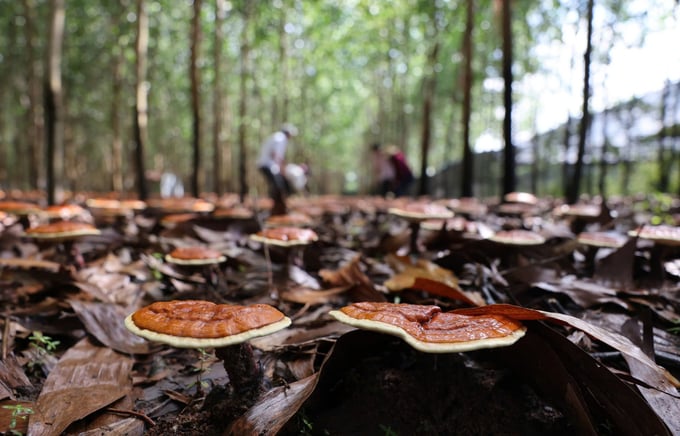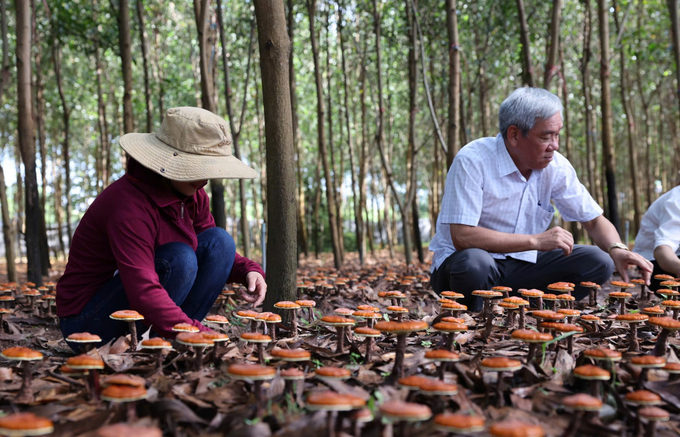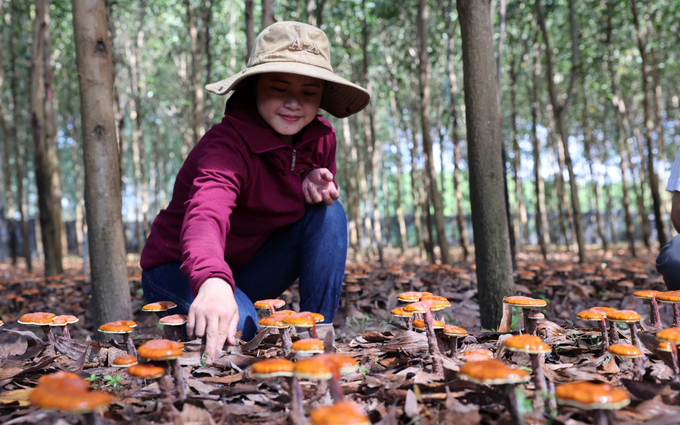June 2, 2025 | 11:18 GMT +7
June 2, 2025 | 11:18 GMT +7
Hotline: 0913.378.918
June 2, 2025 | 11:18 GMT +7
Hotline: 0913.378.918
These days, under the hybrid acacia forest canopy in Cu Kty commune, Krong Bong district (Dak Lak), the atmosphere is bustling as members of the Chu Yang Sin Medicinal Mushroom Cooperative harvest red Lingzhi mushrooms (scientific name Ganoderma lucidum), after more than 3 months of cultivation and care. The fully-grown mushrooms, rich in nutrients and with their characteristic dark brown color, are being carefully collected.
In an effort to find new economic development directions for the local area, the Chu Yang Sin Medicinal Mushroom Cooperative has implemented the model of cultivating red Lingzhi mushrooms under the hybrid acacia forest canopy. So far, the model has shown initial success, leveraging local strengths and paving the way for economic development in remote and ethnic minority areas of Dak Lak province.
According to representatives of the cooperative, since 2022, members of the Chu Yang Sin Medicinal Mushroom Cooperative have traveled to Gia Lai province to study the model and purchase 3.000 red Lingzhi mushroom spores for trial cultivation under the hybrid acacia canopy. The cooperative then collaborated with the Institute of Biotechnology and Environment (Tay Nguyen University) to research the local climate and soil conditions. Additionally, the cooperative received technical training from the institute on red Lingzhi mushroom cultivation to expand the growing area.

Red Lingzhi mushrooms grown under the hybrid acacia canopy by the Chu Yang Sin Medicinal Mushroom Cooperative. Photo: Quang Yen.
The trial cultivation process showed that red Lingzhi mushrooms thrive under the plantation forest canopy. Since April 2023, the Chu Yang Sin Medicinal Mushroom Cooperative has officially begun producing red Lingzhi mushroom spores and planted 35.000 spores/ha of 3-year-old hybrid acacia forest.
After 3 months of cultivation and care, the mushroom garden yielded nearly 850kg of fresh mushrooms, equivalent to about 400 kg of dried mushrooms. With the current selling price ranging from 30 to 35 USD/kg, each kilogram of dried mushrooms yields an average profit of around 21 USD.
One of the advantages of growing red Lingzhi mushrooms in hybrid acacia forests that are 3 years old or older is the consistently stable temperature, ranging from 28 to 32°C. To maintain humidity around 8%, the cooperative waters the mushrooms twice daily for 5 to 10 minutes each time using mist sprayers, ensuring the ground doesn't dry out or overheat, which could harden the mushroom spores and caps.
Mr. Doan Huu Nhi, the technical manager of the Chu Yang Sin Medicinal Mushroom Cooperative, explained that a key benefit of this model is that while waiting to harvest the acacia, the area under the forest canopy can be utilized to grow Lingzhi mushrooms. This model not only increases land use value and provides a sustainable livelihood for growers, but also helps prevent forest fires. Additionally, caring for the mushrooms raises soil moisture levels, which supports the growth of the acacia trees and enhances their productivity.

Red Lingzhi mushrooms thrive under the acacia canopy, bringing high income to local people. Photo: Quang Yen.
According to Mr. Nhi, the cooperative has now mastered the technology of producing mushroom spores, so they plan to expand the cultivation area and increase spore sales in the market to scale up the model, providing locals with a new direction for economic development.
"The technique for growing and caring for red Lingzhi mushrooms under the acacia canopy is fairly simple, easy to implement, and well-suited for households with plantation forests in remote, ethnic minority areas. Therefore, the Chu Yang Sin Medicinal Mushroom Cooperative is ready to transfer the cultivation and care techniques for red Lingzhi mushrooms, while also supporting mushroom spores and helping secure market access as the supply of raw materials increases", Mr. Doan Huu Nhi added.
Mrs. Le Thi Ai Phuong, Director of the Chu Yang Sin Medicinal Mushroom Cooperative, shared that in the beginning, growing red Lingzhi mushrooms under the acacia canopy faced many challenges as it was the first model of its kind in the area.
Despite the difficulties, Mrs. Phuong explained that throughout the development of the model, the cooperative members were proactive in learning from experience while strictly adhering to the processes and technology transferred from the Institute of Biotechnology and Environment.

The Chu Yang Sin Medicinal Mushroom Cooperative has now mastered mushroom spore production and is working with surrounding households to expand the cultivation area. Photo: Quang Yen.
"In a short time, not only did we successfully grow red Lingzhi mushrooms under the forest canopy, but the cooperative also mastered the technology of producing mushroom spores. This helps lower production costs, allowing us to provide more support to disadvantaged households interested in investing and developing this model", said Mrs. Phuong.
The director added that after stabilizing production, the cooperative is focusing on building its brand. The cooperative has completed the necessary paperwork to have its red Lingzhi mushrooms recognized as an OCOP product by the end of 2024.
“Currently, the Chu Yang Sin Medicinal Mushroom Cooperative is negotiating prices with domestic and international partners to establish a stable market presence for its products. Additionally, the cooperative will link with local farmers to guarantee the purchase of their products when they participate in this model, helping the people of Krong Bong district find sustainable livelihoods”, shared Mrs. Le Thi Ai Phuong.
According to Mr. Vo Tan Truc, Head of the Agriculture and Rural Development Department of Krong Bong district, red Lingzhi mushrooms are a valuable herb with many health benefits and are favored in both domestic and international markets.

The Krong Bong District People's Committee will support the development of red Lingzhi mushrooms as a key product of the locality. Photo: Quang Yen.
According to Mr. Truc, the entire Krong Bong district currently has about 4.500 hectares of planted hybrid acacia forest, providing significant potential for the expansion of this model. Leveraging these potentials, the department will advise the district People's Committee to implement solutions aimed at expanding the model for local residents.
“The locality hopes that this model will provide stable livelihoods for the people and contribute to poverty reduction in the deep-lying Krong Bong district. To achieve this goal, the district's specialized departments will actively support the Chu Yang Sin Medicinal Mushroom Cooperative in building its product brand and finding stable markets for consumption.
At the same time, the Department of Agriculture and Rural Development will connect the cooperative with households interested in developing the model to organize training sessions and transfer cultivation techniques. They will also work with local governments to guide the forms of borrowing, maximizing opportunities for residents to access and expand the model, finding effective pathways for economic development in the locality”, Mr. Truc added.
“The effectiveness of growing Lingzhi mushrooms under the forests of the Chu Yang Sin Medicinal Mushroom Cooperative demonstrates that this is a promising model for replication and contributes to economic development in the locality, especially among households involved in forestry, who are from ethnic minority groups. Notably, this model provides dual benefits, creating sustainable livelihoods from mushroom cultivation while also enhancing the productivity of the acacia forests”, assessed Mr. Vo Tan Truc, Head of the Department of Agriculture and Rural Development of Krong Bong District.
Translated by Phuong Linh

(VAN) Seafood by-products are opening a new path, combining green growth and technological innovation to enhance the industry's value.

(VAN) Mr. Nguyen Thanh Cong, Vice Chairman of the Son La Provincial People's Committee, reflects on Son La’s journey from barren hills to fruitful orchards after a decade of hard work.

(VAN) FAO’s Director-General addresses the 5th Baghdad International Water Conference.
/2025/05/26/1716-4-nongnghiep-191706.jpg)
(VAN) Chain linkages, technological innovation, and raw material zoning are three strategic pillars for the coconut industry to strongly develop and elevate its position on the global agricultural map.
![Advanced mariculture – an inevitable trend: [4] Accompanied by scientists](https://t.ex-cdn.com/nongnghiepmoitruong.vn/608w/files/sohk/2025/05/13/1941-pgsts-vo-van-nha-140958_717.jpg)
(VAN) According to Assoc. Prof. Dr. Vo Van Nha, Director of the RIA III, the development of advanced offshore mariculture is no longer an option but an essential path for Vietnam’s fisheries sector.

(VAN) Vietnam is intensifying the development of mollusk farming areas that meet international standards, aiming for sustainable growth and enhancing its export position in the global seafood market.
![Advanced mariculture – an inevitable trend: [3] Policy-driven momentum](https://t.ex-cdn.com/nongnghiepmoitruong.vn/608w/files/doanhtq/2025/05/21/0104-0616-0348-nuoi-bien-170339_789.jpg)
(VAN) To ensure the success of offshore mariculture that uses advanced technologies, it is essential to establish supportive policies that inspire both individuals and enterprises to invest with confidence.